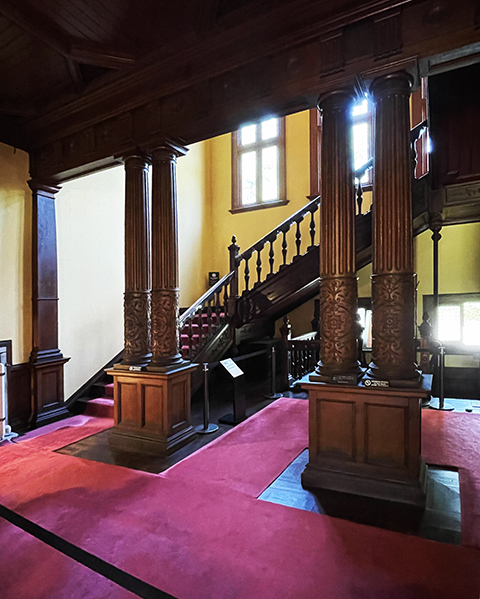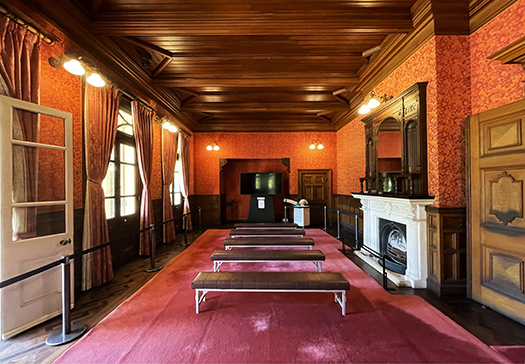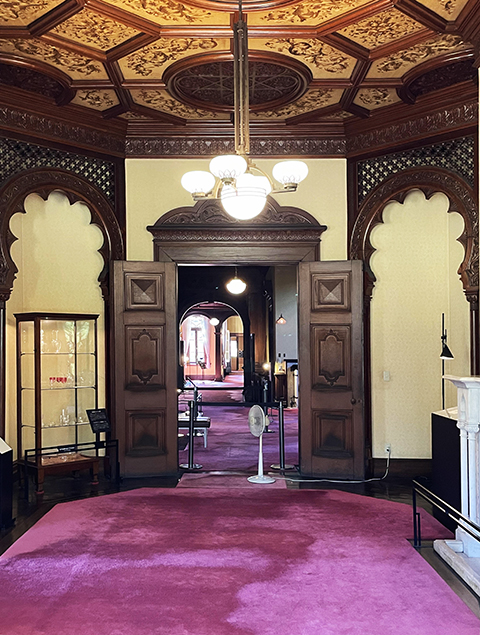


現代の中国を見ていると、ちょうど幕末期の江戸幕府体制を見ているような錯覚にとらわれる。
現代世界というのは西欧文明の自由・平等という人権概念と、自由競争の資本主義によって基盤が形成されている。やはり人類発展の方向性の基本だろう。
そういう文明を受容するのに、日本は明治という時代を持ち、圧倒的なその文明総体を受け入れていった。その明治の日本の状況が現代の中国ではかなり異質に追体験されているように思える。
日本では基盤になる経済というものはあくまでも民間にその主体を委ねた。たしかに官による公共投資財の払い下げなどで不正があったりはしたけれど、そのことをきちんと告発し、不正をただすという常識的ルールが社会に浸透していった。基本的には政治はあくまでも制度の設計・立法に専念し、経済主体としては産業資本の育成を図っていった。
明治新政権は発足前後、大阪の大商家・資本から資金提供を受けたりして、それがその後の三井住友などの財閥形成に向かっていく。一方で、この岩崎邸の当主である三菱創業家・岩崎家は土佐郷士層の出自。幕末当時、志士としての活動家であり、坂本龍馬の海援隊にも関係している。そして一時期は藩から投獄されたりもしている。しかし獄中で同房の商人から算術や商法を学んだことが、後に商業の道に進む機縁となったと言われる。そんなことから志士たちの結社活動などでも財務関係専門家となっていた。
志士たちから「おれたちは倒幕・政治を担うけれど、おまんは経済をやれ」と言われていたという説話が語られる。少なくとも、政治と経済を分離して理解し国家発展には経済の自立性が不可欠だという共通認識が幕末期の人びとにはあったとされるのだ。
現代中国のいまの状況を見ていると、どうもこのあたりの彼我の相違を感じさせられる。
日本では1868年の明治維新の成立から、1890年(明治23年)7月1日に第1回の衆議院選挙が行われた。維新の混乱期から22年ほどで「民主主義」が成立した。近代国家としての自立的経済発展にはこういう政治の民主化は基本要素だろう。一方の中国ではそういう志向性は常に弾圧される。いまの政権の状況を見ていると、こういう「世界標準」を受容するには相当の距離感がある。危機の根は深く、同じアジアの隣国として深く憂慮させられる。安定した平和な国家社会の実現を願うばかり。
もちろん日本もその後の戦争をはさみ順調ではなかったけれど、基本的価値感として民主主義を受容し、経済は国民の自立性に委ねられ続けてきた。

この岩崎家(洋館)でも設計は英国人建築家にすべて委ねられ、いかにも西洋的価値感が全面的に受容されている様子が伝わってくる。写真はサンルーム的な空間と1階の洋間、階段コーナーなど。西洋木造建築的のディテールデザインが正調で展開する。
ただし、この洋館に接続して「和館」と名付けられた和風建築が建てられてもいる。日本社会というのはさすがに「和の国」らしく、新文明を受容しつつ、伝統的な美感というものも大切にしたいと考えてきたのだと思う。和館についても、いずれ写真で触れていきたい。
English version⬇
Yataro Iwasaki, from a Tosa Clan Soldier to an Economist: Exploring the Former Iwasaki Residence-5
The social situation in the neighboring country is worrisome. The former Iwasaki family is like a political merchant among Japanese capitalist zaibatsu. However, the fundamental principle of the separation of politics and economics has always been conscious in Japan. …
Looking at China today is like looking at the Edo shogunate system at the end of the Edo period.
The modern world is based on the human rights concepts of freedom and equality of Western civilization and the free competition of capitalism. This is, after all, the basis of the direction of human development.
Japan had the Meiji period (1868-1912) to accept such a civilization, and it accepted the overwhelming totality of that civilization. The situation in Japan during the Meiji period seems to be being experienced quite differently in modern China.
In Japan, the economy, which is the foundation of the country’s economy, was left to the private sector. Although there were certainly some irregularities in the government’s use of public investment funds, the common sense rule of properly prosecuting and correcting such irregularities permeated the society. Basically, the political system concentrated on designing and legislating systems, while the economic system sought to nurture industrial capital.
Around the time of its inauguration, the new Meiji government received funding from large Osaka merchant families and capital, which later led to the formation of zaibatsu such as Sumitomo Mitsui. On the other hand, the Iwasaki family, the founding family of Mitsubishi, the head of the Iwasaki Residence, came from the Tosa Goshi class. At the end of the Edo period, they were active as Shishi (patriotic samurai) and were associated with Ryoma Sakamoto’s Kaientai. He was also imprisoned by the clan for a time. However, it is said that while in prison, he learned arithmetic and business from a merchant in the same cell, and this is said to have been an opportunity for him to later pursue a career in commerce. Because of this, he also became a financial expert in the activities of the Shishi, including their associations.
It is said that he was told by the Shishi, “We are in charge of the overthrow of the shogunate and politics, but you are in charge of the economy. At the very least, it is said that people in the final days of the Tokugawa shogunate had a common understanding that politics and economics were separate and that economic independence was indispensable for national development.
Looking at the current situation in modern China, one is reminded of the difference between the two countries.
In Japan, the first election for the House of Representatives was held on July 1, 1890 (Meiji 23), following the establishment of the Meiji Restoration in 1868. About 22 years after the turmoil of the Restoration, “democracy” was established. This kind of political democratization is a basic element for independent economic development as a modern nation. In China, on the other hand, such an orientation is always suppressed. Looking at the current situation of the current administration, there is a considerable distance between it and the acceptance of such “global standards. The roots of the crisis run deep, and as a fellow Asian neighbor, I am deeply concerned. We can only hope for the realization of a stable and peaceful national society.
Of course, Japan has not had a smooth transition since the war, but it has accepted democracy as a fundamental value and has continued to leave the economy to the independence of the people.
The design of the Iwasaki House (a Western-style house) was entrusted to a British architect, and it is clear that Western values were fully embraced. The photo shows the sunroom-like space and the western-style room on the first floor. The detailed design of the Western-style wooden structure is developed in a formal style.
However, a Japanese-style building named “Wakan” was also built in connection with this Western-style building. Japanese society is indeed a “country of harmony,” and while accepting the new civilization, it has also sought to value traditional aesthetics. I would like to discuss the wagwan in the near future.
Posted on 9月 7th, 2023 by 三木 奎吾
Filed under: 住宅マーケティング, 日本社会・文化研究







コメントを投稿
「※誹謗中傷や、悪意のある書き込み、営利目的などのコメントを防ぐために、投稿された全てのコメントは一時的に保留されますのでご了承ください。」
You must be logged in to post a comment.